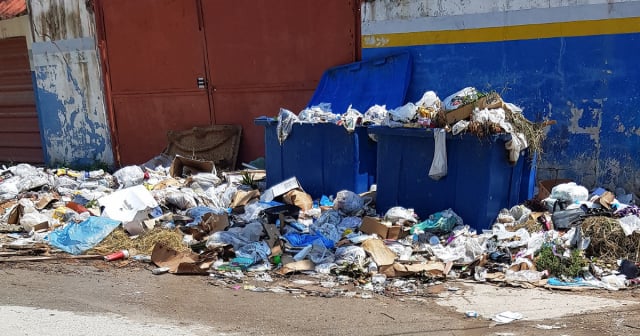Indira Ruiz, 35 years old, lives with her two daughters, aged 13 and 15, on Rastro Street, between Corrales and Gloria, in the Jesús María neighborhood of Old Havana. For a month now, she has had to cook in rubber boots to avoid the feces that come from her bathroom and flood the kitchen of the house. This is not an isolated case; there are more neighbors living on her street, on the ground floor, who are suffering from the same problem.
And the worst part is that they can't do anything to solve it because it is a chaos caused by the authorities, who have closed the gates that allow the sewage to go into the sea.
"We have been dealing with a blockage for a month. It started in the bathroom of the house and has extended to the kitchen. It's not our fault. The blockage comes from the street, from the central area. Both Aguas de La Habana and Aguas Negras, as well as the delegates and the president of the Council, explain to us that the blockage is due to the fact that they have the gates closed because they don't have the machine that pumps the water to the sea, and for that reason, they have closed the gates, which prevents the wastewater from flowing away. As a result, it has entered our house," Ruiz explains in statements to CiberCuba, desperate because she has no other place to go with her daughters until the problem is resolved.
Since the bathroom is out of order, Indira Ruiz and her daughters have to take baths at their neighbors' house, cook with rain boots, and relieve themselves in a bucket. "We are already tired of reporting this problem. They just tell us that until they fix the machine that pumps water into the sea, they cannot open the gates, and we are the ones affected," she said desperately to CiberCuba.
And this does not only affect Indira and her daughters. "The whole street is the same. There are other neighbors affected just like us, with the same intensity, as in my house," she insists in statements to this portal.
The rest of those affected, like Indira Ruiz, are families with children in their care, including minors between two and four years old who have to live with "green ditches of mold due to the blockage." One of the neighbors even went as far as breaking the sidewalk so that the blockage from his house could flow out into the street. "We are desperate."
Generalized unsanitary conditions
In recent years, the Cuban government has been overwhelmed by the illegal dumps that proliferate throughout the Island, especially in Havana. This has led to the proliferation of diseases such as dengue and oropouche, which cost more money to treat than to prevent. Recently, the field study 'Havana, Capital of Waste', prepared by the Cuban Observatory of Citizen Auditing, from the think tank Cuba Siglo 21, linked the increase in crime in the capital of the Island to the rise of uncontrolled landfills in its streets.
While it does not establish a direct relationship between waste and crime, it does consider that "the accumulation of solid waste contributes to certain factors that, in turn, can degrade the real estate value of an urban neighborhood by reflecting a potential crisis in community norms and with it a potential for crime in that community."
Havana produces 23,000 cubic meters (m3) of garbage every day, but the Cuban regime only collects 68% of that urban waste. This means that 32% (7,600 m3, equivalent to three Olympic swimming pools) is left in the streets, which has turned the capital of the Island into "a critical hotspot of health insecurity" due to the proliferation of rodents and mosquitoes, carriers of diseases such as dengue and leptospirosis, in addition to causing fires from methane gas production, like the one that occurred in Lawton earlier this year 2024 when neighbors set a landfill on fire.
At the beginning of this month of October, the ruler Miguel Díaz-Canel launched a comprehensive offensive against the uncontrolled accumulation of garbage in Havana, a situation that affects all municipalities. To this end, he announced a strategic plan in which "each ministry will sponsor a municipality," with the goal of stabilizing solid waste collection and improving hygiene conditions in the city. Now it remains to be seen which ministry is responsible for the neighborhood of Jesús María, in Old Havana, where feces flood the houses.
What do you think?
COMMENTFiled under:
